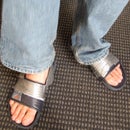Introduction: Remove Rust From a Bicycle With Lime Juice
This Instructable is inspired by a tip from Uruwaza: Secret Everyday Tips and Tricks from Japan (seen here), a book that we keep around the office. Flipping through it one day, I noticed that they had an interesting method for removing rust from a bike, and I thought I'd give it a try. Working with Jessy, we took a tip from the book in another direction and successfully removed the rust from bikes quickly and easily.
We used it on the chain as well as the other metal parts, and it worked well; however, after discussing with some bike experts and receiving comments about it, it has been determined that using it on the chain is a little risky. If you properly clean off the acid (by rinsing and drying thoroughly), it should be fine, but remnant acid could weaken the chain. So be careful!
We used it on the chain as well as the other metal parts, and it worked well; however, after discussing with some bike experts and receiving comments about it, it has been determined that using it on the chain is a little risky. If you properly clean off the acid (by rinsing and drying thoroughly), it should be fine, but remnant acid could weaken the chain. So be careful!
Step 1: Materials
For this Instructable, you'll need:
Citric acid: We used some lime juice we had leftover in the fridge, but any citrus-y juice will work--lemon, lime, etc. According to Urawaza, the citric acid reacts with the iron oxide (rust) so it can be removed.
Abrasive: We used steel wool, but anything gritty to help remove the rust will do.
Paper towels or an old rag. To clean.
A bike. Trying to remove the rust from a non-existent bicycle could prove too much for this Instructable.
Citric acid: We used some lime juice we had leftover in the fridge, but any citrus-y juice will work--lemon, lime, etc. According to Urawaza, the citric acid reacts with the iron oxide (rust) so it can be removed.
Abrasive: We used steel wool, but anything gritty to help remove the rust will do.
Paper towels or an old rag. To clean.
A bike. Trying to remove the rust from a non-existent bicycle could prove too much for this Instructable.
Step 2: Pour Acid Onto Abrasive
Carefully pour some of the citric acid (lime juice) onto the abrasive (steel wool). You want the section of the steel wool to be damp but not dripping with lime.
Step 3: Attack the Bike!
Rub the steel wool on the bicycle. Parts to attack:
Anything with rust that is accessible to clean and dry. Tire rims, supports, and gears (carefully). As for the chain, it is possible if you clean it thoroughly but you apply the acid at your own risk.
I find that the easiest way to clean the bike without taking it apart is to flip the bicycle upside down so that it is resting on the seat and the handlebars.
Your hands will probably get dirty--this is part of the fun. Take lots of dirty-hands pictures.
Anything with rust that is accessible to clean and dry. Tire rims, supports, and gears (carefully). As for the chain, it is possible if you clean it thoroughly but you apply the acid at your own risk.
I find that the easiest way to clean the bike without taking it apart is to flip the bicycle upside down so that it is resting on the seat and the handlebars.
Your hands will probably get dirty--this is part of the fun. Take lots of dirty-hands pictures.
Step 4: Rinse
After you've applied the acid, abrasively, you want to rinse off the acid. Remaining acid could weaken the metal, so you want to rinse off the acid with water. Soak a paper towel with water and go over the parts you rubbed with acid, or find another way of rinsing.
Step 5: Dry Thoroughly
This is crucial: dry all of the parts thoroughly! Take a dry paper towel or old rag and dry, dry, dry. A bunch of grease and rust should end up on the dry rag.
Step 6: Lubricate
To make sure your bike runs as smoothly as possible, lubricate all of the parts that will be moving. Either spray lubricant as you spin the wheels or put some lubricant gel on a towel and gently apply as the chain spins.
This cleaning process is just one of many variations on a theme--you can try any combination of citrus and grittiness. For example, the Urawaza calls for a specific mixture of salt and lemon juice. Let us know the results if you try any other way!
Your bicycle should be ready to ride smoothly through the streets and/or mountains. Onward, Joshmobile III, onward!
This cleaning process is just one of many variations on a theme--you can try any combination of citrus and grittiness. For example, the Urawaza calls for a specific mixture of salt and lemon juice. Let us know the results if you try any other way!
Your bicycle should be ready to ride smoothly through the streets and/or mountains. Onward, Joshmobile III, onward!


![A Summer of [Collegiate Meals]](https://content.instructables.com/FMJ/OYP1/FZ38317A/FMJOYP1FZ38317A.jpg?auto=webp&crop=1%3A1&frame=1&width=130)


